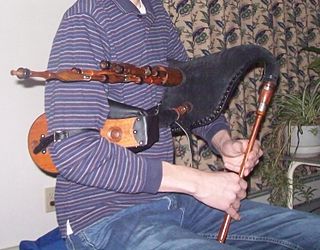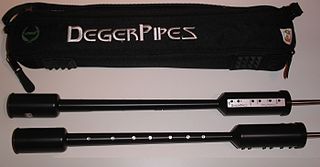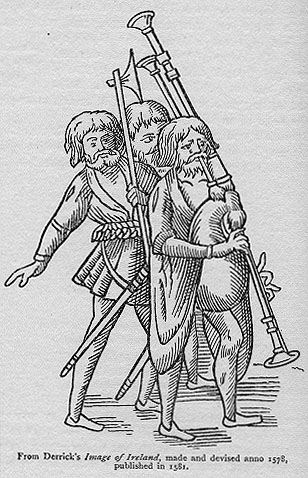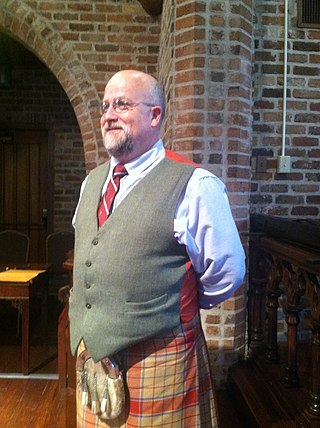
Bagpipes are a woodwind instrument using enclosed reeds fed from a constant reservoir of air in the form of a bag. The Great Highland bagpipes are well known, but people have played bagpipes for centuries throughout large parts of Europe, Northern Africa, Western Asia, around the Persian Gulf and northern parts of South Asia.

The uilleann pipes, also known as Union pipes and sometimes called Irish pipes, are the characteristic national bagpipe of Ireland. Their current name is a partial translation of the Irish language terms píobaí uilleann, from their method of inflation. There is no historical record of the name or use of the term uilleann pipes before the 20th century. It was an invention of Grattan Flood and the name stuck. People mistook the term 'union' to refer to the 1800 Act of Union; however, this is incorrect as Breandán Breathnach points out that a poem published in 1796 uses the term 'union'.

The great Highland bagpipe is a type of bagpipe native to Scotland, and the Scottish analogue to the great Irish warpipes. It has acquired widespread recognition through its usage in the British military and in pipe bands throughout the world.

The Scottish smallpipe is a bellows-blown bagpipe re-developed by Colin Ross and many others, adapted from an earlier design of the instrument. There are surviving bellows-blown examples of similar historical instruments as well as the mouth-blown Montgomery smallpipes, dated 1757, which are held in the National Museum of Scotland. Some instruments are being built as direct copies of historical examples, but few modern instruments are directly modelled on older examples; the modern instrument is typically larger and lower-pitched. The innovations leading to the modern instrument, in particular the design of the reeds, were largely taken from the Northumbrian smallpipes.

The border pipes are a type of bagpipe related to the Scottish Great Highland Bagpipe. It is perhaps confusable with the Scottish smallpipe, although it is a quite different and much older instrument. Although most modern Border pipes are closely modelled on similar historic instruments, the modern Scottish smallpipes are a modern reinvention, inspired by historic instruments but largely based on Northumbrian smallpipes in their construction.

The Northumbrian smallpipes are bellows-blown bagpipes from Northeastern England, where they have been an important factor in the local musical culture for more than 250 years. The family of the Duke of Northumberland have had an official piper for over 250 years. The Northumbrian Pipers' Society was founded in 1928, to encourage the playing of the instrument and its music; Although there were so few players at times during the last century that some feared the tradition would die out, there are many players and makers of the instrument nowadays, and the Society has played a large role in this revival. In more recent times the Mayor of Gateshead and the Lord Mayor of Newcastle have both established a tradition of appointing official Northumbrian pipers.
Pibroch, piobaireachd or ceòl mòr is an art music genre associated primarily with the Scottish Highlands that is characterised by extended compositions with a melodic theme and elaborate formal variations. Strictly meaning 'piping' in Scottish Gaelic, piobaireachd has for some four centuries been music of the great Highland bagpipe.
This article defines a number of terms that are exclusive, or whose meaning is exclusive, to piping and pipers.

The electronic bagpipes is an electronic musical instrument emulating the tone and/or playing style of the bagpipes. Most electronic bagpipe emulators feature a simulated chanter, which is used to play the melody. Some models also produce a harmonizing drone(s). Some variants employ a simulated bag, wherein the player's pressure on the bag activates a switch maintaining a constant tone. As with other electronic musical instruments, they must be plugged into an instrument amplifier and loudspeaker to hear the sound. Some electronic bagpipes are MIDI controllers that can be plugged into a synth module to create synthesized or sampled bagpipe sounds.
Pipe Major Donald MacLeod was a Scottish bagpiper, British Army Pipe major, composer and bagpipe instructor.

The MacCrimmons is a Scottish family that served as pipers to the chiefs of Clan MacLeod for several generations. The MacCrimmon kindred was centred at Borreraig near the Clan MacLeod seat at Dunvegan on the Isle of Skye. At Borreraig the MacCrimmons conducted one of the best known "piping colleges" in the Highlands of Scotland.

Red Hot Chilli Pipers is a Celtic rock band from Scotland. Formed in 2002, the band became popular internationally in 2007 after winning the BBC talent show When Will I Be Famous?
Hugh Robertson (1730–1822) was a Scottish wood and ivory turner and a master crafter of woodwind instruments such as pastoral pipes, union pipes, and great Highland bagpipes.

Irish warpipes are an Irish analogue of the Scottish great Highland bagpipe. "Warpipes" is originally an English term. The first use of the Gaelic term in Ireland was recorded in a poem by Seán Ó Neachtain, in which the bagpipes are referred to as píb mhór.

Chris Apps is a bagpiper and reed-maker.
Roderick J. (Roddy) MacLeod is a Scottish bagpiper, director of the annual Piping Live! Festival and former principal of the National Piping Centre.
Willie McCallum is Scottish Highland bagpipe player.
Chris Armstrong is a bagpiper from Scotland and pipe major of the ScottishPower Pipe Band.
Donald MacPherson was a Scottish bagpipe player, and one of the most successful competitive solo pipers of all time.












